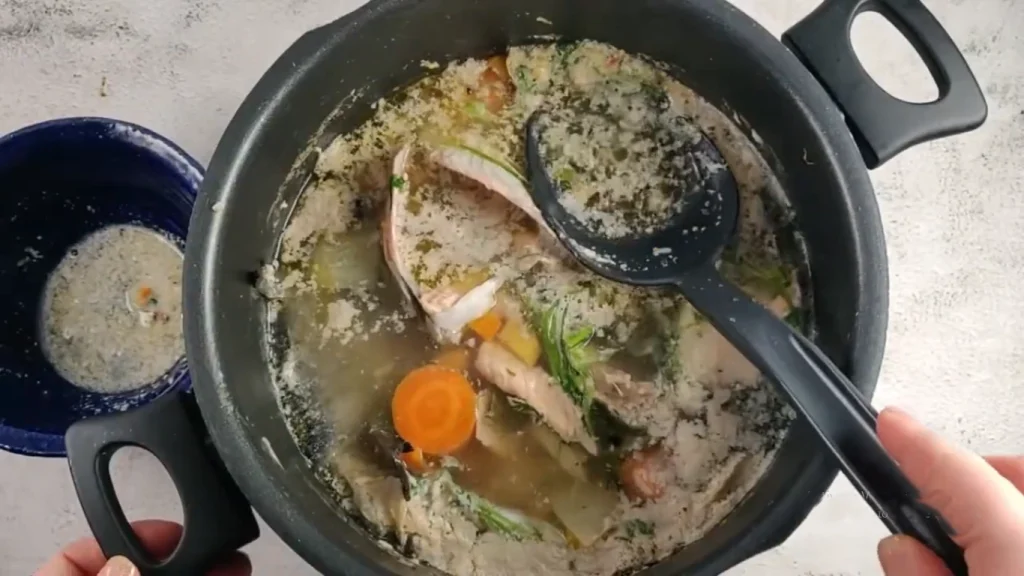Salmon Broth for Cats: An Excellent Super Food For Your Feline’s Health
By: Lana Koh

The information in this article is intended to educate cat parents and is not a substitute for veterinary guidance. In case of any concerns about your cat’s health, please talk with your veterinarian.
Salmon broth is becoming a popular choice among cat owners looking to enhance their pets’ diets. Packed with protein, essential amino acids, and healthy fats, salmon broth offers significant nutritional benefits that support a cat’s overall health. It not only promotes hydration but is also known to aid in digestion and boost the immune system.
Cats are obligate carnivores, meaning they require certain nutrients found in animal products. By incorporating salmon broth into their meals, owners can provide a tasty source of vital nutrients. This natural addition can also complement traditional cat food, giving it an extra nutritional boost that many felines appreciate.
As more pet owners learn about the advantages of salmon broth, they are keen to explore how it fits into a balanced diet. Understanding these benefits helps in making informed decisions for a cat’s health and well-being.
Key Takeaways:
- Salmon broth is a nutritious addition that enhances cats’ hydration and digestion.
- It contains vital proteins and fatty acids, promoting overall feline health.
- Incorporating salmon broth can improve the taste and nutrient profile of regular cat food.
Also Read: Is Beef Liver Good For Cats?
Nutritional Composition of Salmon Broth
Salmon broth offers a variety of nutritional components that are beneficial for cats. It primarily consists of proteins, essential amino acids, vitamins, minerals, and omega-3 fatty acids. Each of these elements plays a significant role in promoting the overall health of felines.
Proteins and Amino Acids
Salmon broth is an excellent source of protein, which is crucial for cats as they are obligate carnivores. The protein content helps support lean muscle maintenance and growth. Rich in essential amino acids, it contains taurine, a vital nutrient for heart health and vision. Amino acids like arginine and lysine also contribute to immune function and tissue repair. Salmon broth usually includes other beneficial proteins such as collagen, which aids in gut health and digestion. Additionally, it can contain small amounts of salmon oil, enhancing fatty acid levels in the diet.
Vitamins and Minerals
Salmon broth is packed with various vitamins and minerals critical for a cat’s health. Key vitamins found in the broth include vitamin A, essential for vision and immune function, and vitamin E, an antioxidant that protects body cells. The broth often contains B vitamins such as thiamine mononitrate, niacin, and pyridoxine hydrochloride, which support energy metabolism and nerve function. Mineral content is also notable, with potassium iodide and calcium pantothenate playing roles in muscle function and overall metabolic processes. These vitamins and minerals work together to enhance a cat’s vitality.
Also Read: Can Cats Eat Tuna?
Hydration and Omega-3 Fatty Acids
Hydration is a critical aspect of a cat’s diet, and salmon broth provides a flavorful way to increase fluid intake. The high moisture content helps support urinary tract health and overall hydration. Additionally, the omega-3 fatty acids found in salmon broth, particularly EPA and DHA, are important for brain health and skin wellness. These fatty acids can reduce inflammation and improve coat quality. The broth can deliver these nutrients in a palatable form, making it an appealing addition to a cat’s diet for both taste and health benefits.
Benefits of Salmon Broth for Cat Health
Salmon broth offers several key benefits for cat health, including support for muscle growth, improvements in skin and coat quality, and promotion of digestive wellness. These benefits are particularly valuable for both adult cats and kittens.
Supporting Muscle Growth and Maintenance
Salmon broth is high in protein, which is essential for muscle growth and maintenance in cats. This protein comes from the fish and provides the necessary amino acids that support healthy muscle development. Kittens, in particular, require adequate protein to build strong muscles as they grow.
Additionally, adult cats benefit from protein to maintain their muscle mass, especially as they age. A well-nourished cat is likely to have more energy and better mobility, aiding in overall well-being.
Read: Can Cats Eat Tofu?
Enhancing Skin and Coat Quality
The nutrients in salmon broth, specifically omega-3 fatty acids, play a crucial role in enhancing skin and coat health. These fats help keep a cat’s skin moist and reduce dryness or irritation.
A shiny coat is often a sign of good health. Providing salmon broth can lead to a healthier, glossier appearance. This can be particularly beneficial for cats that may experience skin issues or dull fur.
Regular consumption of salmon broth can also help reduce shedding and hairball formation, contributing to overall cleanliness in the living environment.
Promoting Digestive Wellness
Salmon broth is beneficial for digestive health due to its natural collagen and amino acids. These nutrients can help improve gut health by supporting the lining of the digestive tract. Healthy digestion is important for nutrient absorption and overall well-being.
For kittens, a healthy gut is essential for growth and development. Adult cats also benefit, especially if they have sensitive stomachs or digestive issues. Salmon broth can be a gentle addition to their diet, providing hydration and nourishment.
Including this broth in their meals can support better digestion and lead to less gastrointestinal discomfort, allowing your cat to thrive.
Comparison with Other Cat Food Types
Salmon broth provides unique nutritional benefits when compared to other cat food types. It’s essential to examine how it stacks up against both dry kibble and chicken-based broths to understand its advantages.
Read: Is Pumpkin a good food for Cats?
Salmon Broth vs. Dry Kibble
Salmon broth is a wet cat food option that offers high moisture content, which is vital for a cat’s hydration. Dry kibble, while convenient, often contains lower moisture levels. This can lead to dehydration, especially in cats.
In terms of nutrition, salmon broth is protein-rich and includes essential omega-3 fatty acids. These nutrients help support skin, coat health, and joint function. In contrast, dry kibble may be high in carbohydrates, which cats do not need in large amounts.
Key differences:
- Moisture: Salmon broth is hydrating; dry kibble is dry.
- Nutritional profile: Salmon broth offers protein and healthy fats, while kibble may have higher carbs and fewer nutrients.
Comparison with Chicken-Based Broths
Chicken-based broths are another popular option for cats. Like salmon broth, they are often made from meat, providing protein that is important for feline health.
However, salmon broth is richer in omega-3 fatty acids, which offer additional benefits for a cat’s coat and skin. Chicken broth typically has a lighter flavor profile and may not appeal to all cats.
When examining carbohydrates, chicken-based broths may be similar to salmon broth but often contain more fillers. This can affect the overall health and diet of the cat.
Key points of comparison:
- Flavor: Salmon may be preferred by some cats over chicken.
- Nutritional benefits: Salmon broth offers unique fatty acids not found in chicken broths.
Interesting Read: Why does my cat’s breath smells like fish?
Feeding Guidelines and Considerations
When introducing salmon broth to a cat’s diet, it is essential to consider proper incorporation methods and appropriate feeding instructions. These factors ensure that the cat receives the full benefits of the broth while maintaining a balanced diet.
Incorporating Salmon Broth into Your Cat’s Diet
Salmon broth can be a tasty addition to a cat’s meals. It is important to start slowly to avoid digestive upset. Begin with a small amount, perhaps a teaspoon mixed into their regular food.
Cats may enjoy the broth on its own or as a topping. If the cat is resistant, mixing it with their favorite food can help.
Maintaining balance is key. Salmon broth should not replace a complete cat food that meets the AAFCO cat food nutrient profiles.
Offering broth 2-3 times a week can be beneficial. Monitoring the cat’s reaction is crucial, and any signs of digestive issues should prompt a reevaluation of the amount fed.
Click To Read: Can Cats Eat Tortillas?
Understanding Feeding Instructions and Portions
Feeding guidelines for salmon broth suggest starting with small portions. A cat weighing around 8-10 pounds can usually handle about 1-2 tablespoons daily.
It is best to combine these portions with regular cat food rather than offering broth as the sole meal. This ensures balanced nutrition while providing hydration.
If transitioning to include salmon broth more regularly, gradual inclusion helps the cat adjust. This practice minimizes the chance of gastrointestinal upset.
Always consult with a veterinarian for tailored advice, especially for cats with health issues or specific dietary needs. Following these instructions ensures a healthy and enjoyable experience for the cat.
Frequently Asked Questions
This section addresses common questions about the nutritional benefits of salmon broth for cats. Each question explores specific health advantages and practical considerations for cat owners.
Conclusion
Salmon broth is a nutrient-rich addition to a cat’s diet, offering essential proteins, omega-3 fatty acids, and hydration that support overall feline health. From promoting muscle growth and enhancing skin quality to aiding digestion, this flavorful supplement complements traditional cat food while addressing specific dietary needs. As more pet owners recognize its benefits, salmon broth is becoming a go-to choice for boosting feline well-being in a natural and appealing way.
Incorporating salmon broth into your cat’s meals is simple and rewarding, but moderation and proper portioning are key. Always consult a veterinarian to ensure it aligns with your cat’s unique health requirements. By prioritizing balanced nutrition and hydration, salmon broth can help your cat thrive, making it a valuable addition to their daily diet.

About the Author
Lana Koh
Lana is a passionate cat lover with years of experience caring for her feline companions. As a dedicated volunteer at animal shelters, she’s gained valuable insights into the world of cats. Lana channels her love and knowledge into writing informative and engaging articles for fellow pet owners, covering topics like cat health, nutrition, grooming, behavior, and the special bond we share with our feline friends.
